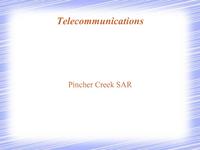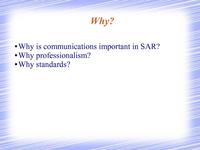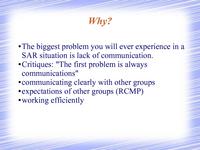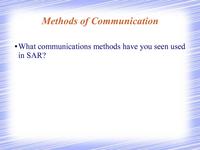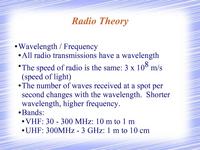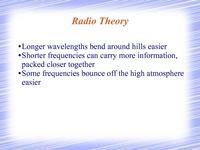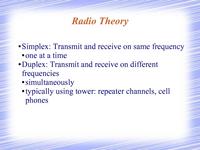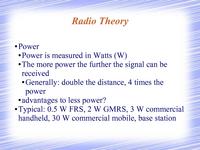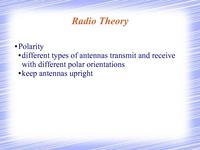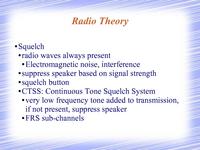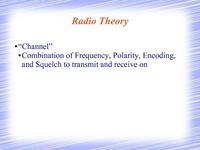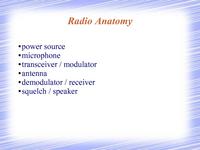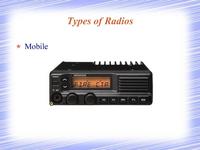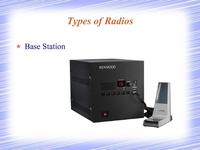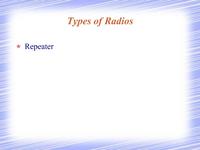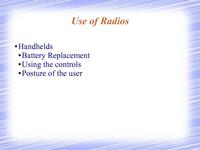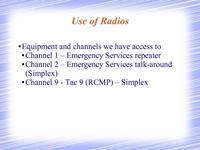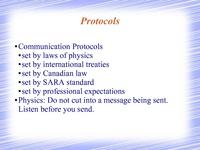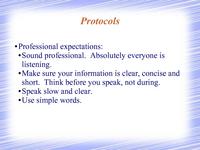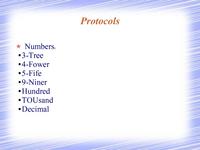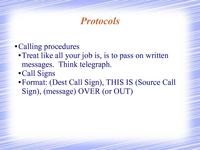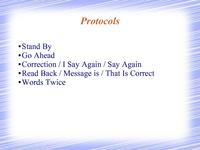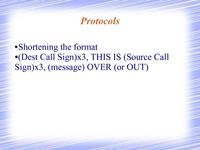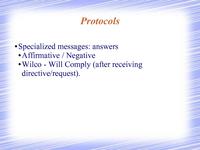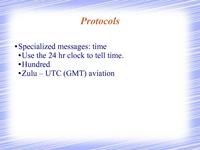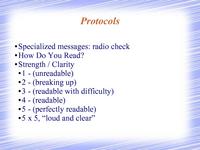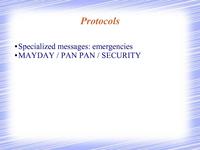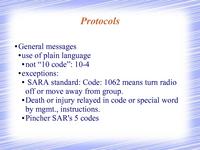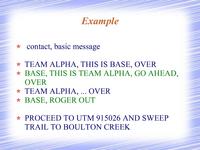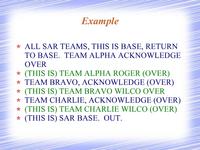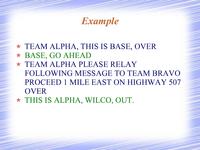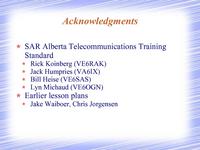SAR Fundamentals/Communications
From PCSAR
(→Time Plan) |
(→Time Plan) |
||
| Line 310: | Line 310: | ||
{{lesson slide|00:51|2 min}} | {{lesson slide|00:51|2 min}} | ||
| - | + | [[Image:Communications-Lesson-Slides.pdf|page=29|200px|right]] | |
* Standard Words and Phrases | * Standard Words and Phrases | ||
* used internationally | * used internationally | ||
Current revision
Contents |
[edit] Subject
What is this lesson plan about?
This lesson plan covers the material of SAR Alberta's Telecommunications Training Standard.
[edit] Authors
List who wrote this lesson plan.
[edit] Scope
What is included in this lesson, what's not and why.
- SAR Fundamentals Manual: Ch.14 "Communications"
- Basic SAR Skills Manual: F-4 "Communications"
- Exercise
This training should include:
- Why communications is important
- Why professionalism, why standards?
- communications methods used in SAR
- Basic radio theory
- Radio waves / light waves
- Frequency
- Bands
- VHF: 30 - 300 MHz: 10 m to 1 m
- UHF: 300MHz - 3 GHz: 1 m to 10 cm
- Bands
- CTCSS - continuous tone coded squelch system
- interference
- FRS sub channels
- Propagation (sara std field)
- Anatomy of radios (sara std field)
- Types of radios
- Base (sara std field)
- Hand Held (sara std field)
- Mobile (sara std field)
- Repeater (sara std field)
- Simplex vs Duplex (Repeater)
- Connectors & Mobile Antennas (sara std field)
- Use of radios
- Battery Replacement (sara std field)
- Using the controls (sara std field)
- Posture of the user (sara std field)
- Base Radio setup and use (sara std control)
- Equipment and channels we have access to
- Communication Protocols
- Do not cut into a message being sent. Listen before you send.
- choosing your words
- Sound professional. Absolutely everyone is listening.
- Make sure your information is clear, concise and short. Think before you speak, not during.
- Speak slow and clear.
- Use simple words.
- Standard Words and Phrases
- ITU Alphabet (sara std field)
- numbers
- 3-Tree 4-Fower 9-Niner
- Calling procedures (sara std field)
- Over - I have finished talking and I am listening for your reply. Short for "Over to you."
- Out or Clear - I have finished talking to you and do not expect a reply.
- Roger - Information received.
- Copy - I understand what you just said (after receiving information).
- Acknowledge - confirm you've received
- This Is ...
- Go Ahead
- Stand By
- Correction / I Say Again / Say Again
- Read Back / That Is Correct
- Wilco - Will Comply (after receiving new directions).
- Affirmative / Negative / Wilco
- Use the 24 hr clock to tell time.
- Radio check
- How Do You Read?
- Strength / Clarity
- 1 - (unreadable)
- 2 - (breaking up)
- 3 - (readable with difficulty)
- 4 - (readable)
- 5 - (perfectly readable)
- MAYDAY / PAN PAN / SECURITY
- Use of plain language (sara std field)
- One exception 10-62 means turn radio off or move away from group. (sara std field)
- PCSAR's codes
- Death or injury relayed in code or special word by mgmt., instructions.
- Call Signs
- All Stations
- Communications Traffic Logging (sara std control)
- Laws
- must identify yourself
- profane language
- false distress
- e.g. tests that seem real
- privacy
- Hands On use of radios
- Calling other stations (sara std field)
- Passing traffic (sara std field)
- Multiple Radio use simulation (sara std control)
[edit] Prerequisites
What should students already know/have accomplished before the lesson is presented.
Communications is such an important aspect of SAR, so please review the following material:
- □ Study Guide for Restricted Operator Certificate
- □ SAR Fundamentals Manual: Ch.14 (pg 201)
- □ Basic SAR Skills Manual: Addendum 4 (pg F-9)
In particular:
- □ memorize the phonetic alphabet
- □ memorize the Procedural Words
- □ study the examples on how the Procedural Words are used
See Assigned reading
[edit] Objectives
At the conclusion of this lesson the participants:
- will meet the requirements of the SARA Telecommunications Training Standard
[edit] Time Plan
Total Time: 60 minutes
- 2018-12: 75 min -- Brett -- included too much theory
- 2013-02: 52 min
| Time | Material
|
|
00:00 3 min |
Introduce topic title Introduce Instructor Present Objectives |
|
00:03 4 min |
|
|
00:07 4 min |
|
|
00:11 3 min |
|
|
00:14 8 min |
|
|
00:22 3 min |
|
|
00:25 2 min |
|
|
00:27 3 min |
|
|
00:30 4 min |
|
|
00:34 1 min |
|
|
00:35 1 min |
|
|
00:36 3 min |
|
|
00:39 1 min |
|
|
00:40 8 min |
|
|
00:48 2 min |
|
|
00:50 1 min |
|
|
00:51 2 min |
|
|
00:53 2 min |
|
|
00:55 12 min |
|
|
01:07 6 min |
|
|
01:13 2 min |
|
|
01:15 2 min |
|
|
01:17 2 min |
|
|
01:19 5 min |
|
|
01:24 8 min |
|
|
01:32 2 min |
|
|
01:34 3 min |
|
|
01:36
|
|
|
01:36
|
Questions |
See Plan (odt) (pdf)
[edit] Aids
What materials are needed or useful in presenting this lesson.
- Slides (download/print: .pdf; edit: .odp)
- FRS Radios
- PCSAR's portable radios
- Brett's portable ham radio
- Example of PCSAR's mobile radio
- computer projector
- laptop
- computer presentation slides
- for each student:
- phonetic alphabet (handout or in text book)
- hand-out:
- see sar/pc/training/subject/sar-fundamentals/components/subject/11-communications
- Phonetic alphabet
- Examples
- Exercise
- Study Guide for Restricted Operator Certificate
- Chapter 14 outline Jorgensen/Waiboer
[edit] Question bank
List of questions suitable for an review/exam of this section.
see Question bank
[edit] Frequently Asked Questions
What are some of the questions that students typically ask. Include the answers.
Q: How do external cell phone boosters work?
A: See http://en.wikipedia.org/wiki/Cellular_repeater
[edit] Feedback
When has this lesson been presented. What was the feedback.
- 2010-10-06 Wuth presentation to PCSAR. Projector did not work. Ran out of time for exercise.
- see msg Date: Thu, 28 Oct 2010 13:32:17 -0600
[edit] License
What can others do with this lesson?
Original content copyright © 2010-2013, Brett Wuth.
This work is licensed under the Creative Commons Attribution-ShareAlike 2.0 Canada License. To view a copy of this license, visit http://creativecommons.org/licenses/by-sa/2.0/ca/ or send a letter to Creative Commons, 559 Nathan Abbott Way, Stanford, California 94305, USA.
[edit] Acknowledgements
- SAR Alberta Telecommunications Training Standard
- Rick Koinberg (VE6RAK)
- Jack Humpries (VA6IX)
- Bill Heise (VE6SAS)
- Lyn Michaud (VE6OGN)
- Earlier lesson plans
- Jake Waiboer, Chris Jorgensen
[edit] Reference Material
If you need to cite sources, do so here.
- SAR Fundamentals Manual: Ch.14 (pg 201)
- Basic SAR Skills Manual: Ch.F-4 (pg F-9)
- Study Guide for Restricted Operator Certificate
- The 2009 SAR Alberta Telecommunications Standard
- GMRS on Wikipedia
[edit] Notes
Any additional notes, etc.
